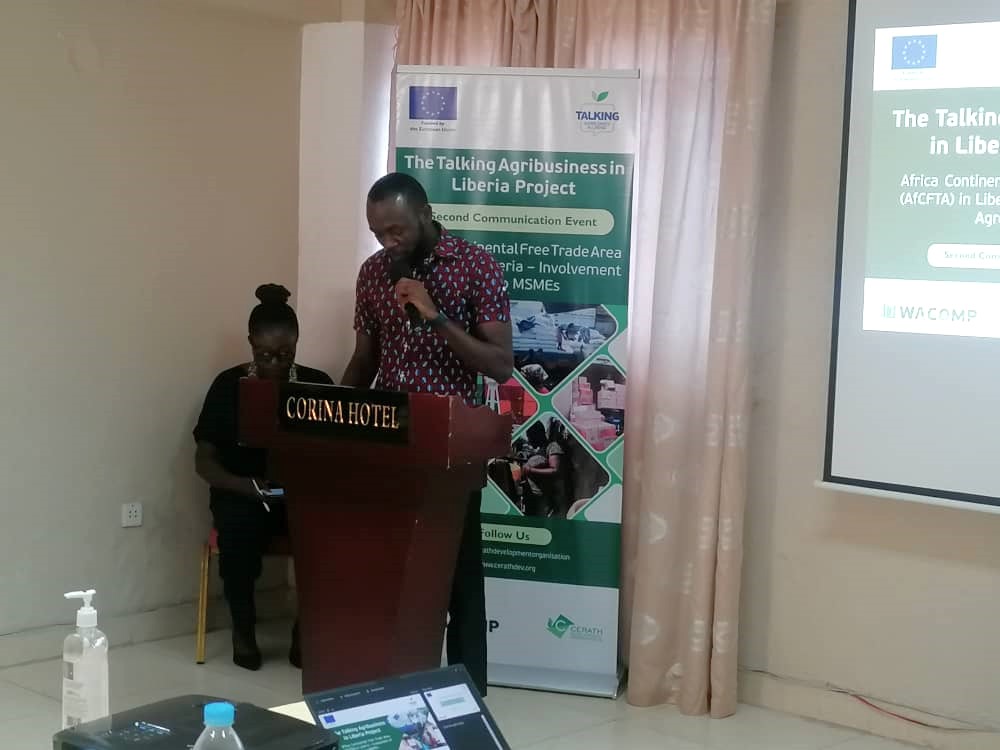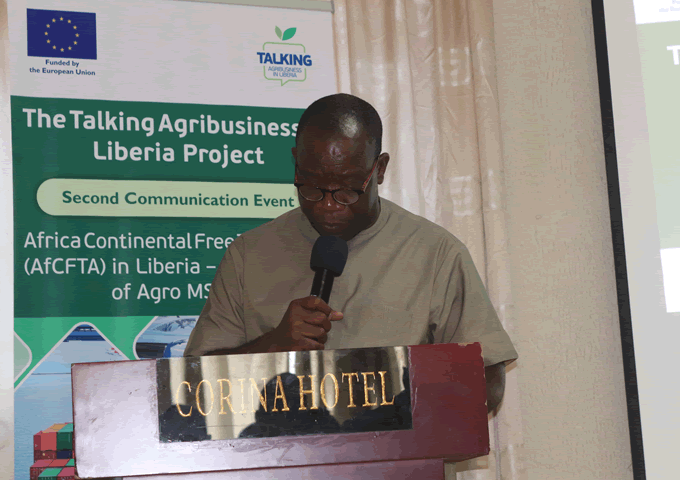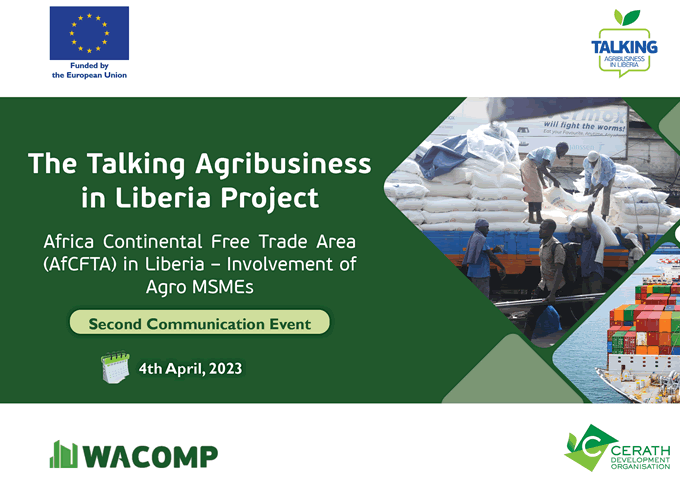The Talking Agribusiness in Liberia project funded by the European Union (EU) held its second communication event in Monrovia (Liberia) on April 4, 2023. The second communication event was dubbed: Africa Continental Free Trade Area (AfCFTA) in Liberia – Involvement of Agro Micro, Small and Medium Enterprises (MSMEs). The event was aimed at providing the platform for learning, exchange of ideas, and to facilitate discussions on the involvement and collaboration of public and private agribusiness sectors on the AfCFTA in Liberia.
Held at the Corina hotel in Monrovia, the event was attended by over sixty participants including chief executive officers of agribusinesses, Liberia Business Association, Liberia Marketing Association, apex bodies, local and international non-governmental organizations, and the donor community. The Government of Liberia was represented by the ministries of finance and development planning, commerce, and industry. It is the second communication event under the project. The Talking Agribusiness in Liberia project is an agribusiness, research, and communications-based action that seeks to disseminate information and raise awareness on the opportunities for business performance and growth, regional (trade) integration of Liberia’s agri-/food value chains as well as an improved environment for agribusinesses to thrive.
Welcoming stakeholders at the event, CERATH Development Organization’s Country Director, Leroy Kanmoh, said the event seeks to disseminate information gathered on Liberia’s progress towards the ratification of the African Continental Free Trade Area agreement. Mr. Kanmoh noted that AfCFTA presents significant opportunities for Liberia noting that the ability of Liberia to industrialize and stimulate an export-driven economy in the light of the AfCFTA is critical.

Speaking at the event, the head of cooperation of the European Union Delegation to Liberia, Jeroen Witkamp said the European Union (EU) is looking at the Africa Continental Free Trade Area Agreement with a lot of keen interest. Mr. Witkamp said the EU looks forward to a time when the free movement of persons and services will be fully implemented in AfCFTA countries, noting that the EU is happy to share its experiences.

The EU head of cooperation stated further that trade and the creation of sustainable jobs are the best engines for economic development in any nation. He noted that the EU through the Cassava Transformation Project is supporting agribusiness and the National Standards Laboratory, as its way of getting the sector ready for the AfCFTA implementation once it passes into law.

James Dobor Na Kulah Sao Sr., Assistant Minister for Economic Management at the Ministry of Finance and Development Planning said Liberia has signed up to the ECOWAS protocols on trade. Noting that AfCFTA will be an expansion of trade at the continental level. Honorable Sao expressed the commitment of the Ministry of Finance to supporting efforts leading not only to the passage of the agreement but the full implementation. Honorable Sao said in other for agribusinesses to be prepared, they need to take advantage of the Ministry of Agriculture’s projects that support agribusiness expansion and development.
For his part, Peter Somah, Assistant Minister for Commence and Industry at the Ministry of Commerce and Industry fully supports efforts that seek to improve the agribusiness sector of Liberia. Honorable Somah says the Ministry of Commerce and Industry is working on supporting the National Legislature with needed expert knowledge for the passage of the agreement.

Minister Somah noted that the ministry through the Liberia Investment, Finance, and Trade (LIFT) project funded by the World Bank and implemented by the ministry will improve Liberia’s investment climate and trade for both agribusinesses and other sectors. Honorable Somah noted that AfCFTA will help provide a market for Liberia-made products and bring about competition.
Presenting the research findings at the event, Maame Kyerewaa Brobbey, project lead, and CERATH Development Organization’s Senior Development Specialist said that 46 out of the 54 countries that signed up to the AfCFTA have ratified. Liberia is one of few countries that have not ratified the agreement. The research found that while Liberia has a technical working group for the ratification and implementation of the agreement headed by the Ministry of commerce. Also, there revealed that there has not been any specified engagement with Liberia’s private agribusiness sector in the formal processes and activities related to AfCFTA. However, government actors have engaged different apex business entities on the AfCTA to differing degrees.

The research notes that the favorable steps towards the implementation of the agreement will include finalizing the national ratification and implementation strategy and carry out extensive stakeholder engagement. The findings indicates that Liberia needs to strengthen institutional structures and ensure national, coordination of the agreement. It also noted that Liberia needs to beef-up awareness efforts of the provisions in the agreement to private sector and determine how the sector benefits from the agreement.
AfCFTA is an agreement among 54 African countries for the creation of a single continental market for goods and services in addition to the free movement of persons, labor and investment geared towards a customs union. Its purpose is to expand intra-African trade through harmonized and well-coordinated trade facilitation regimes. It also aims to harmonize trade instruments across the Regional Economic Communities (RECs).
As part of its mandates, AfCFTA aims to enhance competitiveness at the industry and enterprise levels by exploiting opportunities for economies of scale in production toward continental market access. These will boost intra-continental trade, develop continental supply chains, improve export competitiveness and productivity through reductions in the cost of trade, and ultimately stimulate economic growth to create policy space for industrialization.




